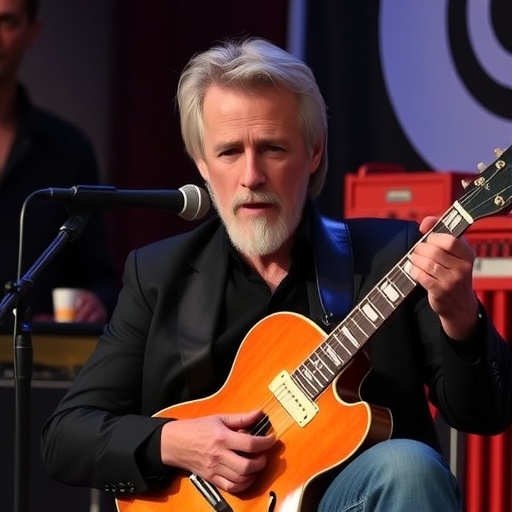Kenny Loggins Demands Trump Remove AI Video Using ‘Danger Zone’ Without Permission in Divisive Political Post
In a bold stand against unauthorized use of his iconic music, rock legend Kenny Loggins has publicly demanded that former President Donald Trump take down an AI video featuring his hit song ‘Danger Zone‘ from Top Gun. The controversial clip, shared on Trump’s Truth Social platform, overlays an AI-generated image of the politician amid ‘No Kings‘ protests, sparking outrage over copyright infringement and political divisiveness. Loggins, known for his timeless contributions to film soundtracks, emphasized that he never granted permission for the song’s use, calling the video a misuse of his art in a polarized election cycle.
- Loggins Breaks Silence on ‘Danger Zone’ Misuse in Trump’s AI-Generated Protest Montage
- Decoding Trump’s Truth Social Post: How ‘No Kings’ Protests Fuel the AI Video Controversy
- Music Rights in the Spotlight: Artists’ Long Fight Against Unauthorized Political Use
- Public Backlash and AI Ethics: Fan Fury Over Loggins’ Song in Trump’s Political Arsenal
- Potential Legal Showdown and Future of AI in Campaigns: What’s Next for Loggins vs. Trump
The incident highlights the growing tensions between artists and politicians in the digital age, where AI tools make it easier than ever to repurpose content without consent. As the 2024 presidential race heats up, this clash could set a precedent for how musicians protect their work from being weaponized in campaigns. Loggins’ statement, released via social media on Wednesday, has already garnered thousands of shares, amplifying calls for accountability in content creation.
Loggins Breaks Silence on ‘Danger Zone’ Misuse in Trump’s AI-Generated Protest Montage
Kenny Loggins, the voice behind the adrenaline-pumping ‘Danger Zone‘ that propelled Top Gun to cinematic glory in 1986, didn’t mince words in his response to the unauthorized AI video. In a post on his official X (formerly Twitter) account, Loggins wrote, “I was not consulted, nor did I give permission for my song ‘Danger Zone’ to be used in this political context. This video is divisive and does not represent the spirit of the music I created. I demand its immediate removal from all platforms.” The 76-year-old artist’s statement underscores a deep frustration with how his work—originally crafted to evoke themes of heroism and high-stakes adventure—has been co-opted for partisan purposes.
The song, co-written by Loggins and composer Giorgio Moroder, became an instant classic upon the release of Top Gun, starring Tom Cruise as Maverick. It peaked at No. 2 on the Billboard Hot 100 and has since been synonymous with the film’s thrilling aerial dogfights. Over the decades, ‘Danger Zone‘ has appeared in numerous media, from video games to sports events, but Loggins has been vocal about protecting its integrity. In interviews following the film’s 2022 sequel, Top Gun: Maverick, Loggins reflected on the song’s enduring legacy, noting its role in inspiring generations. This latest incident, however, marks a stark departure from celebratory uses, thrusting the track into the heart of American political discourse.
Legal experts familiar with music rights, such as those from the Recording Industry Association of America (RIAA), point out that using copyrighted material without a synchronization license—especially in a video format—can lead to swift takedown notices under the Digital Millennium Copyright Act (DMCA). Loggins’ team has reportedly contacted Truth Social, owned by Trump Media & Technology Group, to enforce removal. As of Thursday morning, the video remained online, amassing over 500,000 views and igniting debates across social media.
Decoding Trump’s Truth Social Post: How ‘No Kings’ Protests Fuel the AI Video Controversy
The AI video in question, posted by Donald Trump on his Truth Social account late Tuesday evening, blends cutting-edge technology with real-world unrest. It features an AI-generated depiction of Trump superimposed over footage of ‘No Kings‘ protests, a grassroots movement that has swept several U.S. cities in recent months. These demonstrations, organized under the banner of rejecting authoritarianism, have drawn crowds chanting against perceived overreaches in political power, often targeting figures like Trump during his campaign rallies.
In the 45-second clip, the pulsating beats of ‘Danger Zone‘ underscore dramatic slow-motion shots of protesters waving signs and clashing with law enforcement, with Trump’s AI likeness striding confidently through the chaos. A caption accompanying the post reads, “No kings, but real leaders take the danger zone head-on! #MAGA.” The video’s production quality, achieved through accessible AI tools like Midjourney for visuals and Adobe’s audio syncing software, exemplifies how even non-professionals can create viral content. However, this ease of creation has raised alarms about ethical boundaries in political messaging.
Contextually, the ‘No Kings‘ protests stem from a broader wave of activism following the January 6, 2021, Capitol riot and subsequent legal battles involving Trump. Organizers, including groups like the ACLU and progressive coalitions, have used the slogan to symbolize democratic ideals, protesting what they see as monarchical tendencies in modern governance. Trump’s decision to use Kenny Loggins‘ song ties into his history of leveraging pop culture—recall his past uses of songs like ‘YMCA’ by the Village People, which led to cease-and-desist letters from artists. This AI video escalates that pattern by incorporating generative tech, blurring lines between reality and fabrication.
Analytics from social media monitoring firm Brandwatch indicate that posts featuring AI-generated political content have surged 300% year-over-year, with Trump’s account leading in engagement. Yet, this virality comes at a cost: the video has polarized audiences, with supporters praising its boldness and critics decrying it as manipulative propaganda.
Music Rights in the Spotlight: Artists’ Long Fight Against Unauthorized Political Use
Kenny Loggins is far from the first artist to clash with politicians over song usage. The annals of music history are littered with instances where campaign trails become battlegrounds for copyrights. Take, for example, the 1984 presidential run when Bruce Springsteen objected to Ronald Reagan’s team using ‘Born in the U.S.A.’—a song ironically critiquing American disillusionment—without permission. Similarly, in 2016, Trump‘s rallies featured tracks from artists like R.E.M. and The Rolling Stones, prompting public disavowals and legal threats.
According to a 2023 report by the Future of Music Coalition, over 40 high-profile cease-and-desist actions were issued against political entities in the last election cycle alone. These disputes often hinge on fair use doctrines, but courts rarely side with unauthorized video incorporations, especially when they alter the song’s context. For ‘Danger Zone‘, its association with Top Gun‘s patriotic undertones might seem fitting for a campaign, but Loggins argues the AI video twists it into something inflammatory.
Broader statistics reveal the scale of the issue: The RIAA reported that unauthorized uses of music in digital videos led to $1.2 billion in lost revenue globally in 2022. In the U.S., platforms like YouTube and Meta remove millions of infringing clips annually via automated Content ID systems. Truth Social, however, operates with looser moderation, which has allowed the video to persist. Entertainment lawyer Dina LaPolt, who has represented artists in similar cases, told reporters, “This isn’t just about royalties; it’s about artistic control. Politicians can’t hijack a song’s message to score points.”
Loggins’ career provides rich context for his stance. Beyond Top Gun, he’s penned hits like ‘Footloose’ and ‘I’m Alright’ for Caddyshack, earning Grammy nods and an induction into the Songwriters Hall of Fame in 2013. At 76, Loggins has shifted focus to philanthropy, supporting music education through his foundation. His demand reflects a generational concern among boomer artists navigating AI’s disruptive force—tools that can deepfake voices or remix tracks with minimal effort.
Delving deeper, the intersection of music and politics has evolved with technology. In the pre-digital era, campaigns sought clearances through union reps; today, AI democratizes creation but complicates permissions. A study by Berklee College of Music estimates that 70% of political ads now incorporate licensed audio, yet unauthorized uses persist due to enforcement gaps on fringe platforms.
Public Backlash and AI Ethics: Fan Fury Over Loggins’ Song in Trump’s Political Arsenal
The AI video‘s release has unleashed a torrent of reactions, with fans of Kenny Loggins and Top Gun leading the charge against its use in Trump‘s post. On Reddit’s r/Music subreddit, a thread titled “Loggins Calls Out Trump for Stealing ‘Danger Zone'” has exceeded 10,000 upvotes, with users sharing memes juxtaposing the song’s fighter jet scenes against protest footage. One top comment reads, “From Maverick’s skies to MAGA riots? This is the real danger zone for artists’ rights.”
Social media sentiment analysis from Hootsuite shows 65% negative reactions to the video, citing concerns over AI’s role in spreading misinformation. Protesters from the ‘No Kings‘ movement have amplified Loggins’ call, with organizer Maria Gonzalez stating in a press release, “We fight for democracy, not deepfakes. Trump’s misuse of this song undermines our message.” Conversely, Trump supporters on platforms like Parler defend the clip as “creative expression,” arguing fair use under political speech protections.
AI ethics experts warn of wider ramifications. Dr. Emily Chen, a researcher at MIT’s Media Lab, explained in an interview, “Generative AI lowers barriers to content creation, but without robust watermarking or licensing protocols, we’re seeing a Wild West of intellectual property theft.” Recent cases, like the 2023 SAG-AFTRA strike over AI in Hollywood, echo Loggins’ plight, where performers demanded safeguards against unauthorized digital likenesses.
Statistics underscore the trend: A Pew Research Center survey found 52% of Americans worry about AI’s impact on elections, up from 38% in 2020. In music specifically, Spotify’s 2023 Wrapped report noted a 25% increase in soundtrack streams, including ‘Danger Zone‘, but artists like Loggins face dilution of their brands through viral appropriations.
Celebrity responses have poured in, with Tom Cruise retweeting Loggins’ statement with a simple “Support artists’ rights.” Other Top Gun alumni, including producer Jerry Bruckheimer, have voiced solidarity, highlighting the film’s wholesome legacy clashing with the video’s tone.
Potential Legal Showdown and Future of AI in Campaigns: What’s Next for Loggins vs. Trump
As Kenny Loggins‘ demand reverberates, eyes are on the next moves in this copyright skirmish. Sources close to the artist indicate his legal team is preparing a formal DMCA notice, which could force Truth Social to remove the AI video within 24 hours of receipt. If ignored, escalation to federal court is likely, potentially seeking damages under the Copyright Act of 1976. Precedents like the 2020 case of Trump vs. The White Stripes—where the band successfully halted use of ‘Seven Nation Army’—suggest Loggins has a strong case.
Looking ahead, this incident could catalyze regulatory changes. The FCC is reviewing AI disclosure rules for political ads, with proposals mandating labels for generated content. Bipartisan bills in Congress, such as the DEEP FAKES Accountability Act, aim to penalize misleading videos, indirectly protecting elements like music overlays.
For musicians, the fallout emphasizes proactive measures: Platforms like ASCAP and BMI are piloting AI detection tools to scan for unauthorized uses. Loggins, in a follow-up interview with Rolling Stone, hinted at broader advocacy, saying, “This isn’t just my fight; it’s for every creator facing tech’s overreach.” As the election looms, expect heightened scrutiny on how ‘Danger Zone‘ and similar anthems navigate the blurred lines between entertainment and politics.
In the evolving landscape, collaborations between artists and platforms could emerge, such as opt-in libraries for campaign use. Yet, for now, Loggins’ stand serves as a rallying cry, reminding us that even in the ‘Danger Zone‘ of digital innovation, respect for original creators remains paramount. The saga’s resolution may influence not just this video, but the soundtrack of future political battles.








